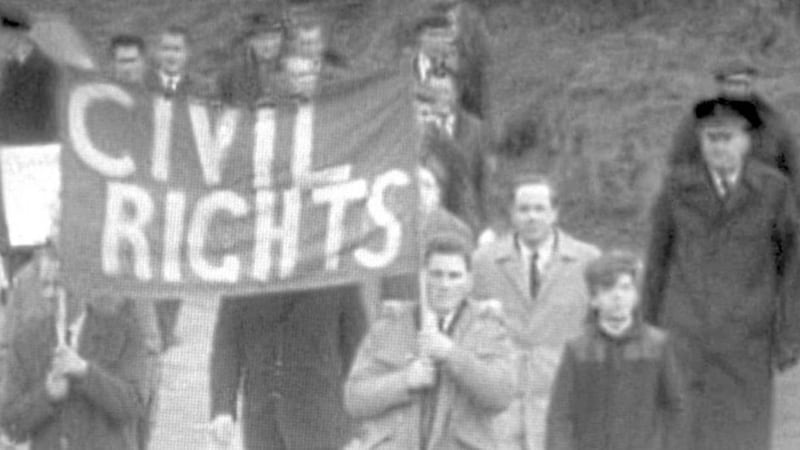Fooling nobody but the most gullible, today’s Sinn Féin, descendants of the Provos, have been massaging the origins of the civil rights campaign. The Catholic Church is meanwhile trying to fine tune an Irish celebration of ‘families’ while scandals about their celibate clergy overlap in the USA. The bigger schemozzle - and the mini-contest over something that happened in 1968 – point up the limits of belief.
There must be a moment when panic about what might be true makes any number of untruths more bearable, and believing Catholics here and elsewhere may have reached that point long ago. Sometimes people choose to believe what they know to be fibs.
Checking back on civil rights is much easier than sorting truth from lies about enabling abuse. ‘Making Sense of the Troubles’ on ‘The O’Neill Years’ will do the civil rights job in thirty very readable pages, authors David McKittrick and David McVea. (Total disclosure; the second David is my husband. The first is widely recognised as the most even-handed analyst of the Troubles. Recommendation of another author follows below.)
Keeping up with church developments as revelations chase each other is a tough enough reporting job, analysing almost impossible. At the weekend Pope Francis wings into not so Holy Ireland, and out again. What people make of the visit will be coloured by what they already think of this pope and the quality of his leadership. Some manoeuvring seems to have gone on for him to meet ‘survivors’ of priestly abuse, not originally scheduled. Whatever this amounts to will probably change few minds.
The church’s Irish public relations has slugged it out with events. Consider: cardinals cancelling their parts in the visit because of scandals in their dioceses, two to date, one supposed to be the Dublin keynote speaker; an official report finding at least 1,000 people, mostly children, abused in Pennsylvania over 70 years by perhaps 300 priests. (Though the grand jury report says the numbers of actual victims and abusers could be much higher.)
Pope Francis three years ago made Cardinal Sean O’Malley, the Capuchin archbishop of Boston, head of a Commission for the Protection of Minors. (It has been accused of doing very little by the two survivors who sat on it and have now resigned.) O’Malley was to host a discussion in Dublin on safeguarding children. Instead he is staying at home as an investigation starts into a seminary in his diocese.
There is a link from Pennsylvania to the Boston investigation, another to today’s archbishop in Washington. That’s Cardinal Donald Wuerl, billed as the Dublin keynote speaker, accused by a Pennsylvania Supreme Court grand jury of concealing abuse. His response has not been impressive, nor on questions about what he knew and when he knew it about his predecessor in Washington, the now disgraced Cardinal Theodore E McCarrick. (As confirmed in June.)
Then there is Cardinal Kevin J Farrell, ‘prefect of the Vatican’s Dicastery for Laity, Family and Life’, described as the pope’s pointman on the Dublin gathering, complained of by former president Mary McAleese. Farrell was ‘shocked, overwhelmed’ by revelation of settlements for sexual abuse and harassment by Cardinal McCarrick, for whom Farrell was auxiliary bishop over six years.
None of this is anti-church propaganda, malicious fiction, though it might look like it to the devout who just want everything to be as it was fifty years ago. No, as it appeared to be fifty years ago. The other link that occurs to an amateur, occasional reader of church stories is that the four prelates mentioned above would all be seen, certainly by conservatives, as on the liberal end of the hierarchy spectrum. What this does to internal developments will no doubt become clear or clearer in time.
Sharp infighting has been evident for a while, amid accusations of heresy and corruption. By contrast, though some find themselves much irked, the local difficulty over a 1968 march is a little thing. Instead of talk about excommunication, the re-purposing on Saturday of that first civil rights march and Sinn Féin’s continuing revisionism has faced derision from genuine activists of 50 years ago, the most effective Eamonn McCann’s ‘an attempt to colonise history’.
In her 1969 ‘Price of My Soul’ Bernadette McAliskey caught well how varied were those marchers. There out of curiosity, she watched as Betty Sinclair, a moderate like all good communists of the day, tried to wind up the meeting peaceably: ‘...she raised her arms and started “We shall overcome”, and everybody else started “A nation once again...”’








